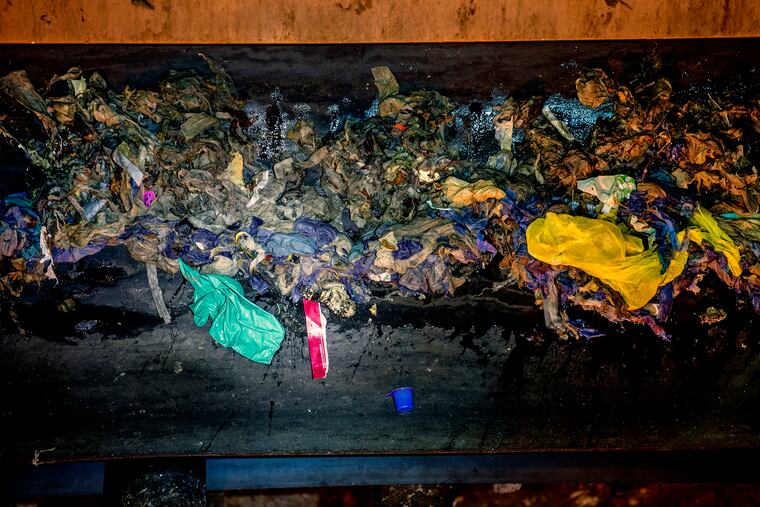What you can flush, and what you can’t, right now
What can you flush? Here's how to avoid needing a plumber for a clogged toilet during the coronavirus shutdown.

People are flushing some bad stuff down the toilet — more than before the pandemic hit.
These bad flushing habits have even gotten the mayor’s attention. During a news conference, Philadelphia Mayor Jim Kenney mentioned how items that shouldn’t be flushed are being flushed. Among them: personal protective equipment such as masks, gloves, and wipes.
“This is taking a toll on our water treatment infrastructure and residents’ own private property,” Kenney said. “So far, 19 of the Philadelphia department’s pumping stations have been impacted by PPE waste, including gloves, masks, and, most of all, wipes. The Water Department has seen 12 times more infrastructure clogging waste at facilities than normal.”
How much is that?
“They are now reporting 100 pounds a month, vs. the usual 100 pounds a year,” Kenney said.
» READ MORE: Flushing of coronavirus wipes, gloves and masks clogs sewer treatment plants
You probably don’t want to call a plumber right now, either. So here’s what you need to know.
What can I flush?
That’s easy. Toilet paper. Only. The Water Department says people should stop flushing anything other than toilet paper along with bathroom waste.
What about thin disinfecting wipes?
Don’t do it. “We understand people want to be safe and are using more wipes these days, but flushing any wipe or any material other than toilet paper is just irresponsible,” Water Commissioner Randy E. Hayman said in a statement. “These materials can create serious problems the moment you flush them. They clog pipes at homes, in the street, and at our facilities. We care about our customers and do not want people to endure the high cost and inconvenience of plumbing repairs, especially during this time.”
Bill Pease, regional vice president of sales and operations for Horizon Services, explained: “When you flush a sanitizing wipe, in most cases they are heavier and lay at the bottom of your pipe, so they can get snagged on other materials. They also absorb the grease and any hair attached to them, and it hinders any breakdown. Most of them will not break down in the sewer system.”
» READ MORE: How to clean your face mask
It’s not just sanitizing wipes that cause problems. According to Hayman, department experts have found that baby wipes, surface cleaning wipes, and paper towels all cause infrastructure and plumbing problems.
The reason? They don’t instantly dissolve like toilet paper.
“Even wipes sold as ‘flushable’ often don’t have the science or regulations to back up that claim, so it’s a pricey gamble,” Hayman adds.
Also according to the Water Department, wipes and materials that do not readily (or ever) break down in the sewer system have the potential to get clogged in the sewer or get trapped within pumps.
In the sewer system, if wipes get clogged, they can act as a magnet for other materials and could cause a partial or full obstruction. These obstructions can lead to sewer backups that impact peoples’ homes or result in the discharge of sewage to streets or rivers and streams.
What else ends up in the sewer? Litter. Of course.
It’s not just items flushed down the toilet. Another very Philly culprit is screwing things up, too. There have been a lot of sewer sightings of PPE litter, such as rubber gloves and masks that are discarded on sidewalks, according to the Water Department.
The department says these items can easily be washed into the sewer system by rain, and can either end up in local waterways or at treatment plants.
Is it time to get a bidet?
Maybe it’s time to just stop flushing anything you don’t need to. A bidet is a small, low bath in which a person washes the, um, lower part of the body.
“I would say it is a good thing to have if it adapts to the system that you have,” Pease said. “It is more sanitary, and you will be using less paper products.”